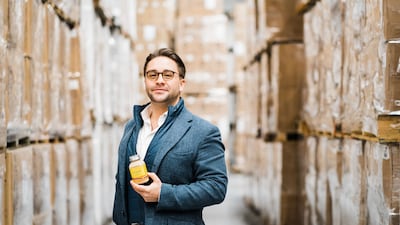When we think of what we are leaving behind for future generations, the harsh reality is a vast legacy of plastic pollutants that take up to 450 years to disintegrate. The silver lining is that innovation has always been our superhuman strength.
Climate change is a non-disputable global challenge, but the collective vision of an eco-revolution is slowly changing mindsets and organic sustenance is making its positive presence felt. Just ask Scottish entrepreneur and Dubai resident David MacDonald, who won the Glasgow Business Award for Entrepreneur of the Year 2023.
The owner and chief executive of Cullen Eco-Friendly Packaging is filled with the urgency to create a renewable solution to mitigate the thousands of tonnes of packaging pollutants. As such, MacDonald has devised a simple alternative to single-use plastic packaging. The versatile Fibre Bottle is a planet-friendly replacement that can be manufactured to any shape, and fit various packaging needs in industries as diverse as horticulture, medicine and fast-moving consumer goods.
“When you consider 500 billion bottles being used annually, my mission is to simply replace single-use plastic by creating the world’s first paper bottle,” MacDonald tells The National. In the past 18 months, the Fibre Bottle has replaced 1.5 billion plastic products in 35 countries, including being used by the NHS in the UK, and is expected to be available in the UAE from this month, to coincide with Cop28.
Made using custom-built machines from moulded pulp packaging scavenged from the recycled by-products of Cullen’s corrugate packaging business through a closed-loop recycling system, these bespoke bottles can hold dry goods such as spices, vitamins and household cleaning products.
At the end of its life cycle, which is about six months, the compostable and biodegradable product will simply return to nature causing no damage to the planet.
MacDonald believes companies such as his shoulder the responsibility that every product bought off the shelves has its environmental footprint created at various stages. “If we can assess right at the packaging stage that the product offers minimal environmental damage, we are already victorious in our attempt to save our planet,” he says. Organic living is a deep-rooted philosophy and a dialogue of choices that consumers consciously need to make, he adds.
He strongly advocates a “flexible approach to life, which means choose organic, keep challenging your mind, shop, gift and celebrate sustainably and, most importantly, adjust your mindset to be productive and have fun by adopting the ‘less is more’ attitude.
“The challenge we face together is that plastic as a product is not the problem; it is how we use it. If you do not buy it, the only option is to change how we sell it.”

